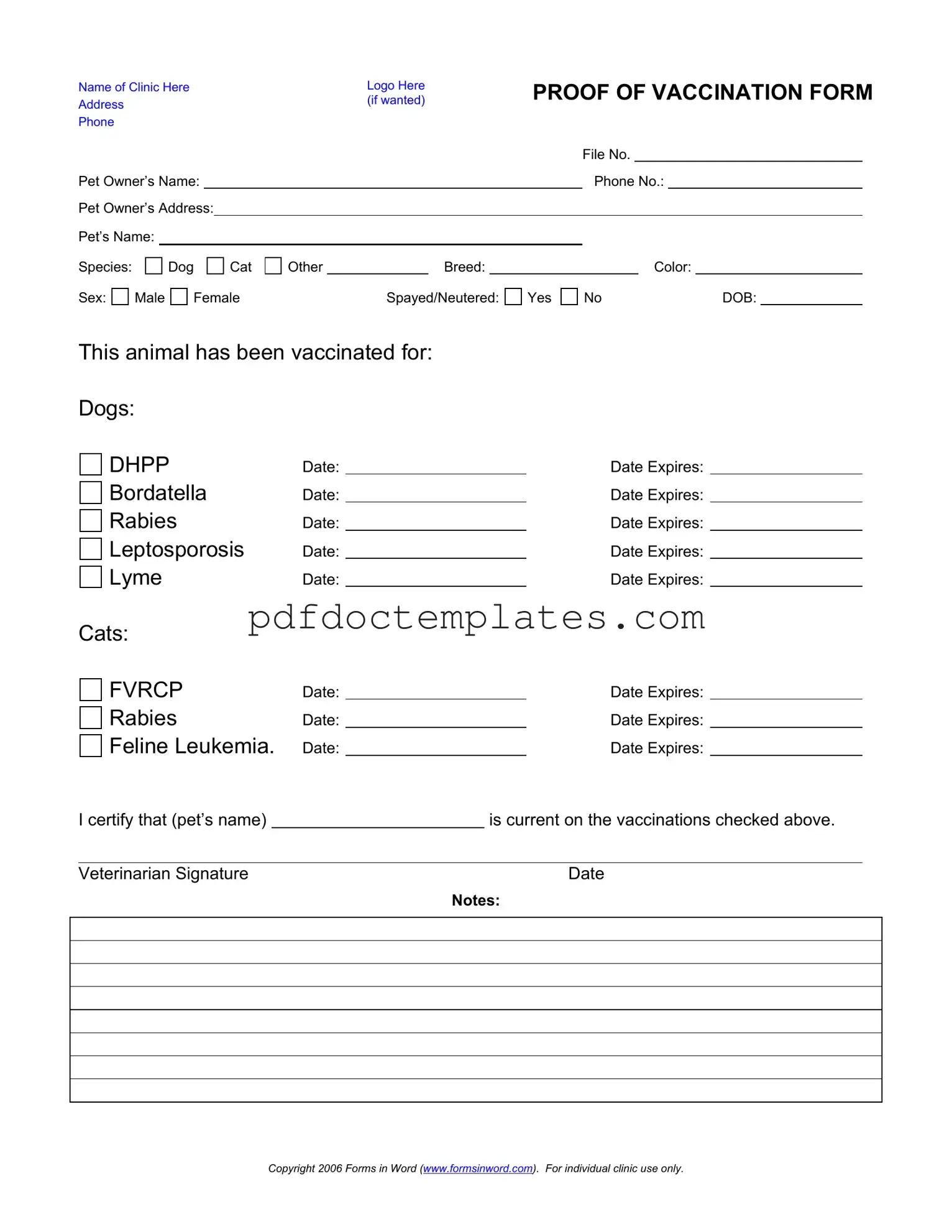Download Proof Of Vaccination Dog Template
Misconceptions
When it comes to the Proof of Vaccination Dog form, several misconceptions can lead to confusion. Here are some common misunderstandings and clarifications:
- Misconception 1: The form is only necessary for traveling with your dog.
- Misconception 2: Any veterinarian can fill out the form.
- Misconception 3: The form is a one-time requirement.
- Misconception 4: The form is not important if my dog is healthy.
- Misconception 5: All vaccinations are required for all dogs.
- Misconception 6: Once my dog is vaccinated, I don’t need to keep the form.
- Misconception 7: The form is the same for all pets.
- Misconception 8: I can fill out the form myself.
While many people associate vaccination proof with travel, it is also crucial for boarding, grooming, and even some dog parks.
Only a licensed veterinarian who has administered the vaccinations can sign the form. This ensures authenticity and accountability.
Vaccinations have expiration dates. Regular updates and renewals are necessary to keep your dog's vaccinations current.
Even healthy dogs need vaccinations to protect against diseases. The form serves as proof that your dog is up-to-date.
Vaccination requirements can vary based on location and the specific needs of your dog. Consult your veterinarian for personalized advice.
It’s essential to retain the form as a record of your dog’s vaccination history. You may need it for various situations in the future.
The form varies depending on whether it’s for dogs, cats, or other animals. Each species has different vaccination requirements.
Only a veterinarian can complete and sign the form. This helps ensure that all information is accurate and verified.
File Details
| Fact Name | Details |
|---|---|
| Purpose of Form | This form serves as proof that a dog has received the necessary vaccinations as required by local laws. |
| Required Information | Pet owners must provide their name, contact information, and details about their pet, including breed, color, and vaccination history. |
| Vaccination Types | The form includes sections for various vaccinations such as DHPP, Bordatella, Rabies, and others specific to dogs. |
| State-Specific Regulations | In some states, specific vaccinations are mandated by law. For example, California requires rabies vaccination for dogs over four months of age. |
Key takeaways
When filling out the Proof of Vaccination Dog form, keep these key points in mind:
- Accurate Information: Ensure that all information about the pet owner and the pet is correct. This includes names, contact numbers, and addresses.
- Vaccination Details: Clearly indicate which vaccinations the dog has received. This includes DHPP, Bordatella, Rabies, Leptosporosis, and Lyme.
- Expiration Dates: Note the expiration dates for each vaccination. This helps keep track of when the next vaccinations are due.
- Veterinarian Signature: A veterinarian must sign the form to certify that the pet is current on vaccinations. Without this signature, the form may not be valid.
- Keep Copies: Always keep a copy of the completed form for your records. This can be helpful for future reference or if proof is needed.
- Use for Travel: This form may be required for travel or boarding. Check specific requirements in advance.
- Updates: If vaccinations change or new ones are added, update the form accordingly to reflect the most current information.
By following these guidelines, you can ensure that the Proof of Vaccination Dog form is filled out correctly and is useful when needed.
Dos and Don'ts
When filling out the Proof of Vaccination Dog form, it’s important to ensure accuracy and completeness. Here are some guidelines to help you through the process:
- Do provide accurate information about your pet's vaccinations.
- Do include your contact details, such as your phone number and address.
- Do ensure the veterinarian's signature is present before submitting the form.
- Do double-check the expiration dates of the vaccinations listed.
- Do keep a copy of the completed form for your records.
- Don't leave any sections blank; fill out all required fields.
- Don't forget to specify your pet’s breed and color accurately.
- Don't use outdated or incorrect vaccination dates.
- Don't submit the form without verifying that all information is correct.
By following these guidelines, you can help ensure that your Proof of Vaccination form is filled out properly, making the process smoother for you and your pet.
Common mistakes
-
Omitting Clinic Information: Many people forget to include the name and address of the veterinary clinic. This information is crucial for verification purposes.
-
Incorrect Pet Owner Details: Providing inaccurate or incomplete information for the pet owner, such as phone number or address, can lead to issues in the future.
-
Neglecting Pet Information: Failing to fill out the pet's name, species, or breed can create confusion and invalidate the form.
-
Misidentifying Vaccination Dates: Some individuals mistakenly write the wrong vaccination dates or forget to include expiration dates, which are essential for maintaining vaccination records.
-
Inaccurate Vaccination Checkmarks: Not checking the appropriate boxes for vaccinations received can lead to incomplete records. Ensure each vaccination is marked correctly.
-
Missing Veterinarian Signature: A signature from the veterinarian is often required. Omitting this can render the form invalid.
-
Overlooking Spay/Neuter Status: Failing to indicate whether the pet is spayed or neutered can affect the interpretation of the pet's health status.
-
Ignoring Additional Notes: Some people overlook the notes section, which can be a valuable space for additional information or special instructions regarding the pet's health.
-
Not Keeping a Copy: Many forget to keep a copy of the completed form for their records. This can be important for future reference or if the form is lost.
What You Should Know About This Form
-
What is the Proof of Vaccination Dog form?
The Proof of Vaccination Dog form is a document that certifies a dog has received necessary vaccinations. It includes details such as the pet owner's information, the dog's breed, and vaccination history. This form is essential for pet owners to demonstrate their dog's vaccination status, especially when required by boarding facilities, dog parks, or during travel.
-
What vaccinations are typically listed on the form?
The form usually includes vaccinations for DHPP, Bordetella, Rabies, Leptospirosis, and Lyme disease. Each vaccination has a corresponding date of administration and an expiration date, ensuring the information is up-to-date.
-
Who fills out the Proof of Vaccination Dog form?
The form is typically filled out by a licensed veterinarian. They will provide the necessary details regarding the vaccinations administered to the dog and sign to certify that the information is accurate.
-
Why is it important to keep this form updated?
Maintaining an updated Proof of Vaccination form is crucial. It helps ensure that your dog is protected against diseases and is compliant with local regulations. Additionally, an up-to-date form can facilitate smoother interactions with pet care services and other pet owners.
-
What should I do if I lose the form?
If the Proof of Vaccination form is lost, contact your veterinarian. They can often provide a replacement or a new copy of the vaccination records. Keeping a digital copy may also be helpful for future reference.
-
Can I use this form for other pets?
This specific form is designed for dogs. However, there is a similar form for cats that includes their required vaccinations. Ensure that you use the appropriate form for each type of pet to avoid confusion.
-
Is there a fee for obtaining the Proof of Vaccination form?
Generally, there may be a fee associated with the vaccination itself, which can include the cost of the form. Check with your veterinarian for specific pricing and any potential charges related to issuing the form.
-
How can I ensure my dog receives all required vaccinations?
Regular veterinary check-ups are essential. Your veterinarian will recommend a vaccination schedule based on your dog's age, health, and lifestyle. Following this schedule helps keep your dog healthy and compliant with vaccination requirements.
-
What if my dog has a medical condition affecting vaccinations?
If your dog has a medical condition, consult with your veterinarian. They can provide guidance on alternative vaccination schedules or exemptions if necessary. It’s important to prioritize your dog's health while ensuring compliance with vaccination requirements.
Proof Of Vaccination Dog Example

Name of Clinic Here |
Logo Here |
Address |
(if wanted) |
|
|
Phone |
|
PROOF OF VACCINATION FORM
|
|
|
|
|
|
|
|
|
|
|
|
File No. |
|
|
|
||
Pet Owner’s Name: |
|
|
|
|
|
|
|
Phone No.: |
|
|
|
||||||
Pet Owner’s Address: |
|
|
|
|
|
|
|
|
|
|
|
|
|||||
Pet’s Name: |
|
|
|
|
|
|
|
|
|
|
|
|
|
|
|
||
Species: |
|
|
Dog |
Cat |
Other |
|
Breed: |
|
|
|
|
Color: |
|
|
|||
Sex: |
Male |
Female |
|
Spayed/Neutered: |
Yes |
No |
DOB: |
|
|||||||||
This animal has been vaccinated for:
Dogs:
DHPP
Bordatella
Rabies
Leptosporosis
Lyme
Date: |
|
Date Expires: |
Date: |
|
Date Expires: |
Date: |
|
Date Expires: |
Date: |
|
Date Expires: |
Date: |
|
Date Expires: |
Cats:
FVRCP
Rabies
Feline Leukemia.
Date: |
|
Date Expires: |
Date: |
|
Date Expires: |
Date: |
|
Date Expires: |
|
I certify that (pet’s name) |
|
is current on the vaccinations checked above. |
|
|
|
|
|
|
|
Veterinarian Signature |
|
Date |
|
|
|
NOTES: |
|
|
|
|
|
|
|
|
|
|
|
|
|
|
|
|
|
|
|
|
|
|
|
|
|
|
|
|
|
|
|
|
|
|
|
|
|
|
|
|
|
|
|
|
|
|
|
Copyright 2006 Forms in Word (www.formsinword.com). For individual clinic use only.
Consider More Forms
Health Guarantee for Puppies Template - The buyer is responsible for all veterinary costs associated with the puppy.
To facilitate a smooth transaction when selling a motorcycle in New York, it is vital to utilize a New York Motorcycle Bill of Sale form, which can be found at https://smarttemplates.net/fillable-new-york-motorcycle-bill-of-sale/. This document not only serves as proof of purchase but also confirms the transfer of ownership, protecting both parties involved.
Navpers 1336 3 - Reasons for any disapproval must be documented on the form.
How to Terminate Parental Rights in Sc - All information filled in this affidavit must be accurate and truthful to be legally binding.
